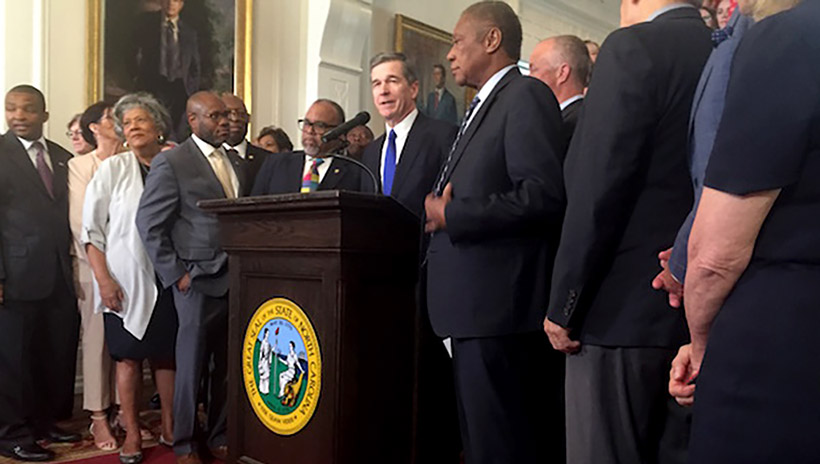Publisher's note: This post appears here courtesy of the Carolina Journal, and written by John Hood.
Gov. Roy Cooper announces Friday, June 28, that he will veto state budget plan. | Photo: CJ Files
North Carolina's state government entered its 2019-20 fiscal year on July 1 without a new state budget in place. Democratic Gov. Roy Cooper and the Republican-led legislature haven't agreed to one, yet. But unless you work for the state, work closely with state-funded entities, or follow state politics closely, you may not have noticed.
Unlike recent budget stalemates in Washington, the face-off between Cooper and legislative leaders in Raleigh hasn't produced a government shutdown. State departments are still operating. Public schools, universities, and hospitals are either open or preparing to open as scheduled. There is no panic.
Thanks to a previously enacted law, the lack of a state budget simply means that agencies will continue to receive their recurring funds at last year's spending levels. What doesn't get funded? One-time needs, additional funds for enrollment growth, appropriations needed to draw down federal funds, new initiatives such as converting North Carolina's Medicaid program to a managed-care system, and, perhaps most significantly, pay raises for public employees.
In response,
the North Carolina House has already passed, and
the North Carolina Senate seems poised to pass, a stopgap bill that addresses some of these needs, including enrollment growth and Medicaid reform. If the budget impasse continues, I can imagine lawmakers passing still another bill that just funds pay raises for teachers and state employees.
Cooper could, of course, veto those bills just as he vetoed the original budget. Having lost seats in both chambers in the 2018 elections, Republicans can no longer override the governor's vetoes without Democratic assistance. But what would that accomplish?
The reason we have a budget impasse in the first place is that each side believes it is in the stronger negotiating position. Only one side is right about that. I think it's the legislature.
Cooper cited a variety of reasons for vetoing the original budget bill. He doesn't like the legislature's cut in franchise taxes, the amount and manner of its pay hike for teachers, and its preference for cash over debt in financing school construction. But the most consequential dispute is about Medicaid. The governor wants to make passage of a new state budget contingent on expanding Medicaid. Legislative leaders don't.
The general lack of panic here is not to Cooper's advantage. Recurring funds are already in place for 2019-20. If he vetoes every supplemental bill the General Assembly sends to him - to fund new students, key initiatives, and potential pay increases - Cooper will clearly reveal himself to be the obstructionist in the story.
I doubt the general public will rise up in fury if there's no new state budget in place, at least not in the short run. But those most affected by the lack of a new spending plan, such as vendors and public employees, will be immensely frustrated. On balance, I suspect they'll blame the guy saying no, not the lawmakers saying yes.
There is a path out of this thicket, I think. It will require both sides to change course a bit, as is usually the case. Cooper will have to find a face-saving way to withdraw
his ultimatum on Medicaid expansion. Perhaps the fact that an expansion bill already passed a House committee could be part of a declaration of partial victory. For their part, legislative leaders will have to budge on overall expenditures as well as specific line-items. But they already know that.
Like it or not, North Carolina has divided government. Neither party has the power to get everything it wants. Policymakers will have to reconcile themselves to the fact that accomplishing some of their most-cherished goals will not be possible in the short run. They'll have to be patient, using the time either to persuade members of the other party or to defeat them in the next election.
In the meantime, while there is no emergency, North Carolina does need a full spending plan enacted for the 2019-20 fiscal year - and for the legislative session to conclude. Let's get on with it.
John Hood (
@JohnHoodNC) is chairman of the John Locke Foundation and appears on "
NC SPIN," broadcast statewide Fridays at 7:30 p.m. and Sundays at 12:30 p.m. on UNC-TV.


























